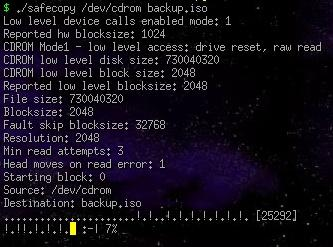safecopy

Safecopy uses an incremental algorithm to identify the exact beginning and end of bad areas, allowing the user to trade minimum accesses to bad areas for thorough data resurrection.
Multiple passes over the same file are possible, to first retrieve as much data from a device as possible with minimum harm, and then trying to retrieve some of the remaining data with increasingly aggressive read attempts.
Safecopy includes a low level I/O layer to read CDROM disks in raw mode, and issue device resets and other helpful low level operations on a number of other device classes.
Safecopy is useful in forensics investigations and disaster recovery.
Latest reviews
5
MUST BE RUN FROM CLI. DO not launch from the store, or look for an application menu.
5
Worked perfectly recovering files on DVD in RAW. Went to Disk Image Mounter and the files were recovered and intact.
5
great tool! i've been albe recover photos and oggs from damaged hdd on my old laptop